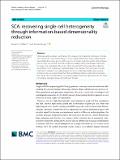SCA: recovering single-cell heterogeneity through information-based dimensionality reduction
Author(s)
DeMeo, Benjamin; Berger, Bonnie
Download13059_2023_Article_2998.pdf (3.527Mb)
Publisher with Creative Commons License
Publisher with Creative Commons License
Creative Commons Attribution
Terms of use
Metadata
Show full item recordAbstract
Abstract
Dimensionality reduction summarizes the complex transcriptomic landscape of single-cell datasets for downstream analyses. Current approaches favor large cellular populations defined by many genes, at the expense of smaller and more subtly defined populations. Here, we present surprisal component analysis (SCA), a technique that newly leverages the information-theoretic notion of surprisal for dimensionality reduction to promote more meaningful signal extraction. For example, SCA uncovers clinically important cytotoxic T-cell subpopulations that are indistinguishable using existing pipelines. We also demonstrate that SCA substantially improves downstream imputation. SCA’s efficient information-theoretic paradigm has broad applications to the study of complex biological tissues in health and disease.
Date issued
2023-08-25Department
Massachusetts Institute of Technology. Computer Science and Artificial Intelligence Laboratory; Massachusetts Institute of Technology. Department of MathematicsPublisher
BioMed Central
Citation
Genome Biology. 2023 Aug 25;24(1):195
Version: Final published version